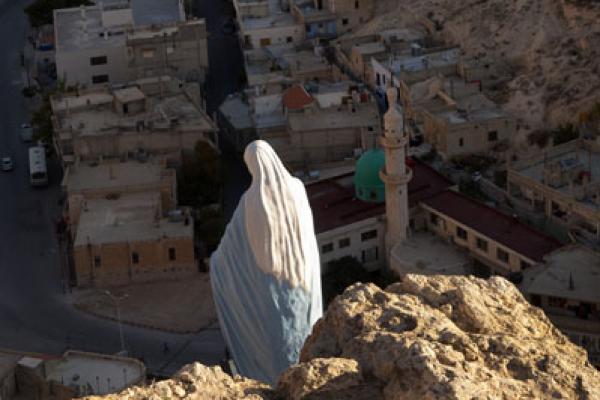If we're going to talk about food, we need to start with theology. Before chocolate was invented, a snake put "sinfully delicious" and "decadent" on the menu. Somebody fell for the marketing ploy, and we've had a complicated relationship with food ever since.
We've also had a complicated relationship with sex, and with siblings, and with weapons of mass destruction. It's all there in Genesis (where the WMDs are swords). And pretty soon, right-thinking people started coming up with rules to keep people from doing bad things. You can have sex with this person but not that one. You really shouldn't deceive, sell, or kill your brother. Beat your swords into plowshares.
The rules helped to restrain bad guys, and they gave would-be good guys some helpful pointers. Still, there were plenty of bad guys to go around, and good guys could get pretty anal about what other people should or shouldn't do. Anyway, it's obvious that you don't create a good marriage simply by avoiding sex with the wrong person, and you don't have a pleasant Thanksgiving dinner simply by not killing your siblings, and you don't banish war simply by wiping out as many weapons as possible. The rules are helpful — adultery, fratricide, and genocide are really bad ideas —but if you want a Peaceable Kingdom, you're going to need more than rules.
We live in a church context where so many embrace unbiblical either/or understandings of Christianity: Either evangelism or social action, either inward journey or outward journey. And on and on.
It is the widespread onesidedness that makes Rich Nathan’s new book so exciting.
Meet “Our Lady of Perpetual Exhaustion,” a saint everyone probably can relate to.
The chaos of everyday life and the methods we use to overcome it are on display at the “Our Lady of Perpetual Exhaustion” exhibit in two D.C. galleries.
“We all have coping mechanisms,” said Cynthia Farrell Johnson, creator of the exhibit’s theme. “And for most of us, part of our coping mechanism is our spiritual life.”
Angélique Namaika, a Roman Catholic nun, rides a bicycle on the rutted roads of the Democratic Republic of Congo’s northeastern province of Orientale, which is plagued by rebel violence.
On these same roads, the Lord’s Resistance Army, a Christian rebel group led by Joseph Kony, a self-proclaimed prophet of God, has been killing, abducting, and mutilating women and children.
But none of that has deterred Sister Namaika from helping displaced women learn trades, start small businesses, and go to school.
Pakistan’s constitutionally mandated Council of Islamic Ideology told the government anyone who wrongly accuses a person of blasphemy against Islam must be executed — a measure intended to protect innocent people who are often killed by mobs.
The CII demanded the measure after endorsing Pakistan’s blasphemy laws, which allow a death sentence for people found guilty of desecrating the Quran, the Prophet Muhammad, mosques, or Islamic beliefs.
A straggle of kids came up for children’s time at Poland Presbyterian Church, a 211-year-old congregation established on Lot One, in Township One, in Range One of what was once known as the Connecticut Western Reserve.
The church’s education minister asked them to do this year’s CROP Walk in nearby Youngstown. Two miles, five miles, whatever they can do to raise money for alleviating hunger.
“Seventeen million children will go to bed hungry in America tonight,” she explained.
A huge statue of the Virgin Mary towers over churches, monasteries and mosques in the Syrian city of Maaloula, where a dialect of the Aramaic language of Jesus is still spoken.
The town has managed to stay out of the Syrian conflict between Sunni Muslim rebels and the regime of dictator Bashar Assad, as have most of Syria’s 2 million Christians.
But worsening violence has forced the community into a corner: Continuous clashes between the rebels and the regime in this isolated town of 2,000 people as well as other Christian towns over the past two weeks have many Christians worried that they will no longer be allowed to stay neutral.
As the Creation Care campaign associate at Sojourners, my job is to get people thinking about God’s call for us to care about the creation. Usually, I do that from behind a desk in Washington, D.C., but recently I got to do it from a boat out on the bayou in Louisiana, in a tiny community that has been hit by eight disasters in eight years (seven hurricanes and the Deepwater Horizon oil spill). I took 100 people out to the town of Jean Lafitte, less than an hour from New Orleans, to hear from people who live on the front lines of climate change.
One of the obstacles to igniting a passion about climate change is that it feels so abstract; it feels like a future problem, a global problem. But it’s really a here and now problem. We took folks out on the Louisiana bayou to meet with those who are living in the midst of climate change – people who don’t think of themselves as environmentalists, but who can bear witness to the impact that climate change and our use of dirty energy have had on their lives, personally.
The town of Jean Lafitte is an old and diverse town, a close-knit community where faith is important to many people, including the mayor. It’s a town that sounds a lot like the early Christian church. We were told that homelessness is not a problem there – if your neighbor loses her home, why wouldn’t you take her in? We were told that when the state government showed up two weeks after Hurricane Katrina, the town had recovered so quickly that the government thought the hurricane hadn’t hit them. This community comes together, and because it knows how to survive, it often gets forgotten by government responders and by oil companies like BP.






